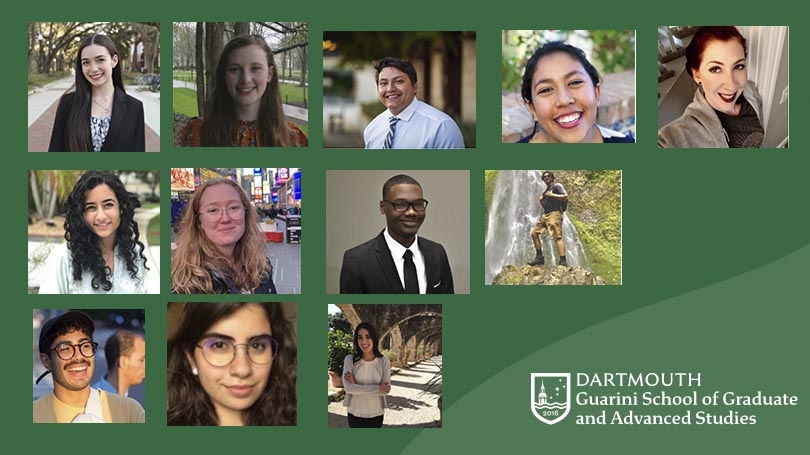How do you participate in a summer research program when the lab you were planning on working in has all but closed? This was the challenge facing the 2020 cohort of students in the Guarini Arts and Sciences Undergraduate Research Experience (ASURE).
When applications opened via the Leadership Alliance organization at the end of 2019, students were eager to be matched with a high caliber mentor with similar research interests, and hoping for a residential summer program that would include guidance on the graduate school application process, experiential research methodology and practice, and a chance to experience life in the Upper Valley.
As COVID-19 ran rampant throughout the country leading to research ramp-downs and travel restrictions it became clear that 2020 was not going to be a typical year.
ASURE, now in its tenth year at Dartmouth, is led by ASURE director and assistant dean of diversity, recruitment, marketing and communications Jane Seibel, with the support of several graduate student coordinators, who receive a stipend for the duration of the program.
In a typical year, Seibel works to match applicants through the Leadership Alliance with faculty in labs at Dartmouth. Applicants tend to be in their junior year and are interested in pursuing graduate level studies. A cohort of approximately twelve students are welcomed on campus in June and spend eight weeks working on a research project under the guidance of their matched faculty member.
As plans for the in-person program unraveled and pivoted to a virtual version, Seibel says the challenge was unprecedented, but thanks to support from the student coordinators and faculty, what emerged was as close to the original as feasibly possible.
"With the help of the student coordinator and the three Guarini Diversity Fellows, we were able to make adaptations and to create a virtual program that actually allowed us to enroll more students than we have in the past," says Seibel. And so, v(irtual)ASURE came into being.
This year's student coordinators Melisa Fuentes, Alberto Ruiz, Hector Sanchez, and Gretel Torres worked to develop vASURE with increased emphasis on professional development and preparation for graduate school applications. The experience has provided the 2020 cohort with a real insight to the graduate application process thanks to the guidance of students and faculty who developed a full slate of virtual events.
Fuentes is in her third year as an ASURE coordinator and she shared that while the pandemic has certainly proved challenging, it has given the vASURE cohort opportunities for much closer guidance than they might otherwise have received under normal circumstances.
"I was amazed by the work they put into connecting us with graduate students and faculty at Dartmouth and their willingness to answer our questions," Abrahams says. "I appreciated the coffee hours where we could just talk and make connections I never thought I could make sitting at home."
Faculty have also made significant contributions to the virtual program, offering a schedule of round tables, talks, and discussion about their work and research areas. In spite of the lack of physical presence, the 2020 cohort have felt that vASURE has been an enriching and worthwhile experience.
The v2020 cohort are:
Rhiannon Abrahams: cellular biology, La Sierra University, California
Jenna Crawford: biology, Norfolk State University, Virginia
Niusha Daneshdoost: biomedical engineering, Miami University, Ohio
Lizbeth Jardon: organismal biology and comparative world literature, Cal State Long Beach, California
Lasair Macha Ni Chochlain: biology with a minor in marine science, Penn State, Pennsylvania
Zannie Montgomery: psychology and English, Tougaloo College, Jackson, Mississippi
Sarah Olshan: psychology with behavioral and cognitive neuroscience, University of Florida
Lauren Onweller: biomedical engineering, Penn State, Pennsylvania
Edward Oropeza-Rodriguez: biotechnology, UC Irvine, California
Luis Ovando: biology, Rider University, New Jersey
Alicia Pietramale: immunology, University of Texas at San Antonio, Texas
Kordell Schrock: data science, human computer interaction, and computer sustainability, Iowa State University, Iowa
Miya Spinella: mathematics, UMass Dartmouth, Massachusetts
Farwah Zaidi: psychology and health science, University of Florida
